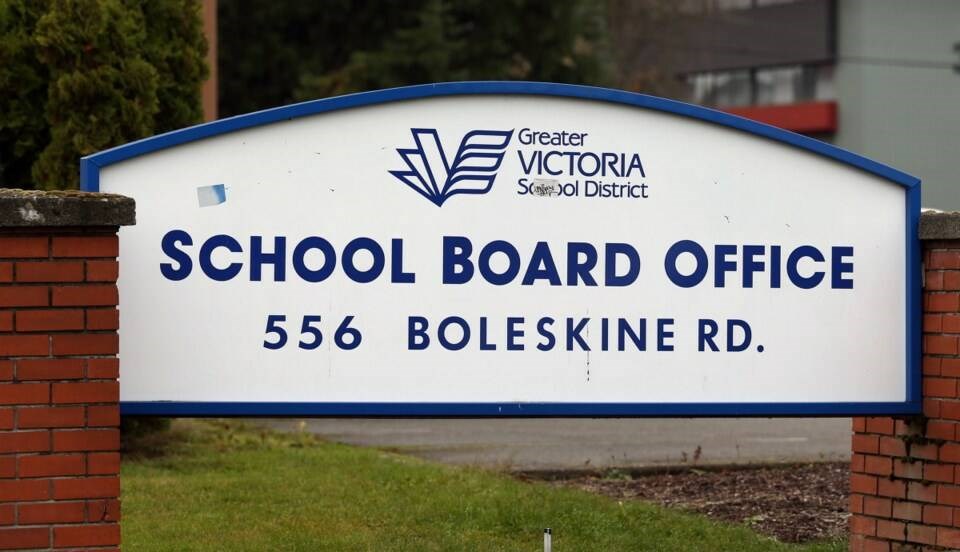The chiefs of the Esquimalt and Songhees First Nations are condemning the Greater Victoria School District’s shutdown of the school police liaison officer program and its handling of the resulting controversy.
In a letter to Education Minister Lisa Beare, they reiterated “grave concerns regarding governance missteps and lack of meaningful consultation surrounding the discontinuation of the SPLO program.”
They urge the minister to order a comprehensive review of the board’s composition and practices.
“The continued actions taken by the board reflect a deep failure to honour the principles of reconciliation, cultural safety and relational accountability, which are central to respecting our Nations as rights holders.”
Esquimalt Chief Jerome Thomas and Songhees Chief Ron Sam wrote that the decision resulted in the removal of an RCMP Indigenous policing unit officer who spent ten years building meaningful relationships.
“This abrupt decision has caused immediate and tangible harm, eroding the sense of physical and cultural safety that our students are entitled to.”
School board chair Nicole Duncan was explicitly warned about the two nations’ concerns last year. They told her the decision was “egregious.”
The chiefs’ letter says they are alarmed about the lack of follow-up and collaboration since then.
“The board has neither revisited the issue … nor respected our standing. … It is intolerable that we must reiterate that consultation is not a box to check; it is any ongoing commitment to co-develop solutions in the spirit of reconciliation.”
After the Education Ministry ordered the board to produce a safety plan due to the continuing controversy over the decision, the Esquimalt and Songhees Nations again reiterated their desire to have the Indigenous RCMP unit allowed back into schools while the plan was being devised.
But the board submitted a safety plan — not yet public — with no further consultation with the First Nations.
They have had no communication from the board on the topic for more than a year.
The letter states: “The ongoing actions of the board, including involving the Human Rights Commissioner to bolster their decision, not only fail to address local concerns, but also deepen our relational fracture.
“The board has failed repeatedly to listen from a place of humility, openness and mutual respect.
“We demand better from our governance partners.”
The letter said reconciliation requires engagement, collaboration and respect.
“This board has failed at all three.”
B.C. Human Rights Commissioner Kasari Govender was invited to speak to the board last week. She had earlier urged all school boards to end such programs until studies prove they are beneficial. She said it was not ideological, just based on the need for more evidence.
At the same meeting, a letter from the Greater Victoria Teachers’ Association was cited; it said that the government’s demand for a safety plan was anti-democratic. The teachers union said: “It is outrageous that police seemingly have a direct conduit to the minister of education, while teachers … are routinely left unheard.”
Local police, led by Victoria Chief Del Manak, have repeatedly criticized the board decision and urged that it be revisited.
Esquimalt Nation education director Kalie Dyer said the decision to bar police from district schools “lit a fire” with both nations and the letter represents the intense frustration over the board’s refusal to listen.
Dyer sat on the school board committee to review the SPLO program but had to leave due to workload. It eventually produced an inconclusive report and the board made the unanimous decision to end it, on the grounds that “undeniably, some students and staff do not feel safe with police in schools.”
Black, Indigenous and people of colour have been specifically cited by the board as groups who are fearful.
But Tuesday’s letter is the second formal objection to that stance by Indigenous people. Earlier this year a group of Indigenous women wrote an open letter objecting to the removal of the SPLO program.
“We call upon the school board to apologize for blaming Indigenous people for ending the program, and find a way to make up for this offence.”
A different group — the Support Network for Indigenous Women and Women of Colour — has backed the board’s decision, however.
Dyer said the two nations made it clear they wanted the highly-regarded RCMP Indigenous police unit back in the schools. “We heard absolutely nothing from the board and still to this day have no idea what was included in the safety plan.”
Several experienced youth counsellors, some determined parents and numerous associations representing minority groups have criticized the stance against police and have been urging the return of school liaison officers for more than a year.
Although the safety plan was submitted two weeks ago, the letter is expected to add considerable pressure on how Education Minister Lisa Beare responds to it.
She has the power to accept or reject the plan.
There is no indication that school police liaison officers are included in it.
If they aren’t, the Indigenous leaders’ letter is the latest example of how serious the demands for reinstating the program have become.
>>> To comment on this article, write a letter to the editor: [email protected]



